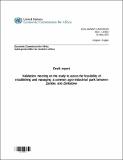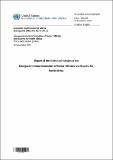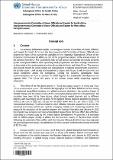| dc.description.abstract | The coronavirus disease (COVID-19) health crisis, which has turned into a socioeconomic crisis, has highlighted the structural weakness of the economies of Central Africa, which are poorly diversified, insufficiently industrialized and rely on low-value-added exports. They are heavily dependent on exports of primary commodities, especially oil, which makes them highly vulnerable to sharp price fluctuations in international markets, and are exposed to various external and global shocks and to debt unsustainability. The global shift to a low-carbon economy in the long term, an inevitable choice to mitigate climate change, will cause a dramatic decline in demand for fossil fuels, leading to divestment and stranded assets in the fossil-fuel producing countries of Central Africa. Accordingly, countries must strive to strengthen their economies. Beyond protection against shocks, economic diversification is increasingly recognized as essential for economic development. It is usually accompanied by industrial upgrading through technology diffusion, leading to higher productivity and greater efficiency in the allocation of productive factors within and across sectors. Central African countries need inclusive and technology intensive industrialization and structural change to enhance their socioeconomic development, which cannot be achieved without having access to sustainable energy services. Affordable and reliable energy is a co-requisite for improved industrial productivity and competitiveness and thus a crucial element in economic diversification. Precarious access to electricity and underdevelopment of the energy sector have had negative repercussions on the development of the economic, industrial and social fabric of the subregion. Central Africa has vast potential to develop renewable energy, which can be harnessed for industrialization, economic diversification, development and poverty alleviation. | en |
| dc.title | Renewable energy development for industrialization and economic diversification in Central Africa | en |
| uneca.subject.fulltaxonomy | UNBIS::NATURAL RESOURCES AND THE ENVIRONMENT::ENERGY RESOURCES | en |
| uneca.subject.fulltaxonomy | UNBIS::INDUSTRY::INDUSTRIAL SECTOR::INDUSTRIALIZATION | en |
| uneca.subject.fulltaxonomy | UNBIS::INDUSTRY::INDUSTRIAL SECTOR | en |
| uneca.subject.fulltaxonomy | UNBIS::NATURAL RESOURCES AND THE ENVIRONMENT::ENERGY RESOURCES::RENEWABLE ENERGY SOURCES | en |
| uneca.subject.fulltaxonomy | UNBIS::GEOGRAPHICAL DESCRIPTORS::AFRICA::CENTRAL AFRICA | en |
| uneca.creatorCorporate.fulltaxonomy | Corporate Authors::United Nations. Economic Commission for Africa. Subregional Office Central Africa (SRO-CA) | en |
| ags.creatorCorporate | United Nations. Economic Commission for Africa. Subregional Office Central Africa (SRO-CA) | en |
| ags.subjectThesaurus | ENERGY RESOURCES | en |
| ags.subjectThesaurus | INDUSTRIALIZATION | en |
| ags.subjectThesaurus | INDUSTRIAL SECTOR | en |
| ags.subjectThesaurus | RENEWABLE ENERGY SOURCES | en |
| ags.subjectThesaurus | CENTRAL AFRICA | en |
| ags.descriptionNotes | Includes bibliographical reference. | en |
| ags.publisherPlace | Addis Ababa : | en |
| ags.publisherName | UN. ECA, | en |
| dc.date.accessioned | 2023-02-09T12:15:01Z | |
| dc.date.available | 2023-02-09T12:15:01Z | |
| dc.date.issued | 2022 | |
| dc.identifier.uri | https://hdl.handle.net/10855/49371 | |
| dc.format.extent | 16 p.: ill. | |
| dc.language | eng | |
| dc.type | Policy paper | |
| uneca.workflow.processed | true | |
| ags.subjectThesaurus | ENERGY RESOURCES | |
| ags.subjectThesaurus | INDUSTRIALIZATION | |
| ags.subjectThesaurus | INDUSTRIAL SECTOR | |
| ags.subjectThesaurus | RENEWABLE ENERGY SOURCES | |
| ags.subjectThesaurus | CENTRAL AFRICA | |
| ags.subjectClassification | 03.10.00 ENERGY RESOURCES | |
| ags.availabilityNumber | b12024235 | |
| ags.availabilityNumber | 2022 | |
| ags.availabilityLocation | ECA-HQ | |
| ags.rights.termsofuse | public | |
| ags.JN | b12024235 | |
| uneca.language.supported | en | |




